In 2021, the pandemic continues to cause uncertainty, anxiety, and divisiveness. Amid calls for a cancelation and all the negativity in the media, Tokyo 2020 bows to pressure and regretfully decides to ban overseas spectators and even local spectators. Meanwhile, spectators are allowed at pro baseball and soccer games and sumo. In the end, the Games are held safely and successfully with majority public support buoyed by Japan’s record haul of medals.
Updated: May 7, 2023
Compiled and written by Philbert Ono (former TOCOG employee). Preserving Tokyo 2020 history and memories.
Go to:
Jan. 2021 | Feb. 2021 | Mar. 2021 | Apr. 2021 | May 2021 | June 2021
July 2021 | Aug. 2021 | Sept. 2021 | Oct. 2021 | Nov. 2021 | Dec. 2021 | Venue Photos
Other years:
2011 | 2012 | 2013 | 2014 | 2015 | 2016 | 2017 | 2018 | 2016 | 2017 | 2018 | 2019 | 2020 | 2021 | Olympics | Paralympics | Venues | 2022
Abbreviations
IOC: International Olympic Committee
IPC: International Paralympic Committee
TOCOG: Tokyo Organising Committee of the Olympic and Paralympic Games
TMG: Tokyo Metropolitan Government
NOC: National Olympic Committee
NPC: National Paralympic Committee
Five organizers: TOCOG, IOC, IPC, TMG, and government of Japan
WHO: World Health Organization
All venues also have a three-letter abbreviation.
🔴 Important events and milestones for Tokyo 2020.
🍀 Important developments and milestones for Games volunteers (“Field Cast”).
*Japanese personal names are written with the family name before the given name.
*Click/tap on the image thumbnail to enlarge the image.
*Special thanks to Games volunteer and staff friends who contributed photos.
*To correct any errors in this chronology, contact us.
JANUARY 2021
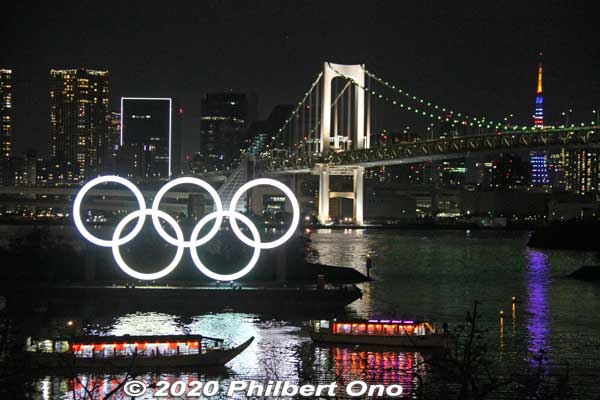
Early January 2021: Soon after New Year’s, the number of Covid cases reach record levels in Tokyo (2,000+ cases/day). News media and social media in and outside Japan continue to bash Tokyo 2020 and spread negativity.
January 7, 2021: Second State of Emergency consequently starts in Tokyo and neighboring prefectures. Ends on March 22, 2021.
January 13, 2021: Due to the spread of the coronavirus variant overseas, Japan bans even business travelers hitherto permitted to travel from 11 countries (China, Korea, etc.) and regions. This in effect bans all foreigners from entering Japan.
January 19, 2021: Three people in Shizuoka Prefecture become the first in Japan who had never traveled overseas to be found infected with the coronavirus variant from the UK. The other 40+ cases of the coronavirus variant in Japan were all people who had been overseas.
January 21, 2021: Citing an unnamed senior member of Japan’s ruling coalition, The Times in the UK reports that the Japanese government has “privately concluded that the Tokyo Olympics will have to be cancelled because of the coronavirus.” This is flatly denied by the IOC, Japanese government, TOCOG, and TMG.
🍀Late January 2021: Volunteers start to receive the “Shift schedule survey” to indicate which days they are unavailable for volunteer duty.
FEBRUARY 2021
🔴 February 3–March 16, 2021: IOC and TOCOG issue the first “playbooks” for international sports federations, athletes, and the media. The downloadable playbooks (PDFs) provide basic, common-sense guidelines and rules for Covid. They are updated in the coming months. https://olympics.com/ioc/tokyo-2020-playbooks
🔴 February 3, 2021: Tokyo 2020 announces that athletes and officials will not be required to be vaccinated for Covid-19 to take part in Tokyo 2020.
February 3, 2021: TOCOG President Mori Yoshiro makes sexist remarks about women in Olympic committees “talking too much, making meetings longer.” They become a media firestorm.
February 4, 2021: TOCOG President Mori Yoshiro goes before the press and reads a standard statement of apology for his sexist remarks the day before. No intention of resigning. Defiant attitude toward questions from the press. The IOC says Mori’s apology makes it “Case closed” even though the Japanese media and public want Mori to resign. Later on its website on Feb. 9, the IOC backtracks and strongly condemns Mori’s sexist remarks as going against the Olympic pledge.
🍀February 7, 2021: Volunteers receive an apology email from TOCOG for Mori Yoshiro’s sexist remarks. TMG receives over 500 phone calls complaining about Mori.
🍀February 8, 2021: It is reported that 390 Games volunteers dropped out due to Mori Yoshiro’s sexist remarks. The number increases to 1,000 by Feb. 23, 2021.
🍀February 12, 2021: TOCOG president Mori Yoshiro apologizes again and resigns for his sexist remarks about women. His preference for sports administrator Kawabuchi Saburo (84) to replace him is also quickly shot down by people not wanting to see another elderly man at the helm.
Mori later mentions that his wife, daughter, and granddaughter also scolded him.
February 14, 2021: Pfizer’s COVID-19 vaccine becomes the first in Japan to be approved for use.
February 17, 2021: COVID-19 vaccinations in Japan finally start with 40,000 healthcare workers inoculated with Pfizer’s vaccine.
February 17, 2021: Shimane Prefectural Governor Maruyama Tatsuya states that the Games should not be held while the pandemic is uncontrollable and he does not want to hold the torch relay in Shimane scheduled for May 2021. He would make a final decision in about a month. (Torch relay in Shimane is held as scheduled.)
🔴 February 18, 2021: To replace Mori Yoshiro, Hashimoto Seiko resigns her post as Minister of the Tokyo Olympic and Paralympic Games to be appointed as the new TOCOG President.
🔴 February 18, 2021: To replace Hashimoto Seiko, Marukawa Tamayo is appointed Minister of the Tokyo Olympic and Paralympic Games for her second time.
February 2021: Covid vaccinations finally start in Japan with healthcare workers. Followed by seniors (65+) and people with underlying conditions. Vaccinations to be free in Japan.
MARCH 2021
March 3, 2021: As a result of Mori’s sexist remarks, TOCOG announces 12 women joining its executive board to increase the percentage of women on the board from 20 percent to 42 percent. They including Sydney 2000 Olympic marathon gold medalist Takahashi Naoko.
March 10, 2021: Thomas Bach is reelected as IOC president for a final four-year term.
March 11, 2021: Thomas Bach states that the COVID-19 vaccine from China would be made available to Tokyo 2020 and Beijing 2022 athletes.
TOCOG President Hashimoto Seiko states the next day that vaccination would not be required for athletes at Tokyo 2020. Olympic Minister Marukawa states any Chinese vaccine would first have to be approved in Japan, so it currently cannot target Japanese athletes.
March 18, 2021: Sasaki Hiroshi, Olympics creative director for the Tokyo Olympics Opening and Closing Ceremonies, resigns after Japanese weekly magazine Shukan Bunshun reported the day before that he had a brainstorming idea in 2020 to have comedian Watanabe Naomi appear at the Opening Ceremony dressed as a pig, called “Olympig.” His brainstorming proposal, made in a online, private chat group with his work colleagues, was quickly rejected, but apparently later leaked to the magazine.
🔴 March 20, 2021: Following a meeting between TOCOG, IOC, IPC, TMG, and the Japanese government (five organizers), Japan sadly decides to disallow overseas spectators from Tokyo 2020 Olympics and Paralympics to minimize the Covid risk especially with the unpredictable coronavirus variants. This still leaves the door open to domestic spectators.
The IOC had stated that it would agree with whatever Japan decides, while Sebastian Coe (President of World Athletics) had urged organizers not to rush their decision on overseas fans.
🍀 The news cause much concern among Games volunteers overseas regarding whether they would be allowed to enter Japan.
🔴 Ticket refunds from authorized ticket resellers (ATRs) overseas soon become a major headache and uproar especially when CoSport sends an email on March 27, 2021 stating that the 20 percent handling fees would not be refunded to US customers since it was already spent by the company. About 600,000 Olympic tickets and 30,000 Paralympic tickets had been sold to overseas customers.
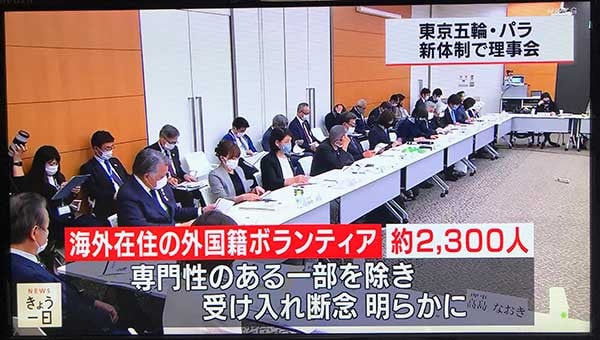
🍀March 22, 2021: Following a board meeting, TOCOG regretfully announces that they have decided to disallow non-Japanese, overseas Games volunteers from entering Japan, forcing them to withdraw as volunteers. However, only 500 overseas volunteers with special skills, experience, or qualifications would be allowed entry. They would be notified directly. (They included some equestrian and fencing volunteers.) Overseas volunteers who are Japanese nationals would still be allowed in.
Affected overseas volunteers receive no official advance notice about this decision. They first hear about it on the news like everyone else. Great disappointment and sadness among volunteers overseas and in Japan.
🍀It was reported for the first time that out of the 9,000+ volunteers who are foreign nationals, only 2,300 are overseas and the rest are Japan residents. Only 2.8 percent of the 80,000 volunteers are overseas residents. https://english.kyodonews.net/news/2021/03/edfd499032a5-olympics-500-foreign-volunteers-may-be-admitted-for-tokyo-games.html
Spring 2021: Tokyo 2020 Olympic Torch Relay
🔴 March 25–July 23, 2021: Delayed by a year, the Tokyo 2020 Olympic Torch Relay begins at the J-Village soccer training center in Fukushima Prefecture. The torch relay slogan is “Hope Lights Our Way.” With a total of 10,515 torch bearers, the torch relay is to proceed to all 47 prefectures. However, in some cities, the torch relay is taken off public roads and substituted with a lighting ceremony to prevent crowds.
With the national mood still muted, a few celebrity torch bearers drop out. To prevent crowding, people are discouraged to see the torch relay. If it gets too crowded, the relay may skip that leg. However, this is never been implemented.
There is staff (or volunteers) telling people to disperse if the roadside gets too crowded.
The torch relay was originally designed to attract crowds. So the torch route is mostly on the busiest roads of the city.
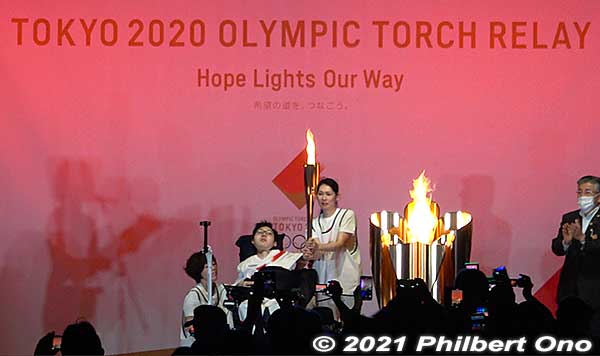

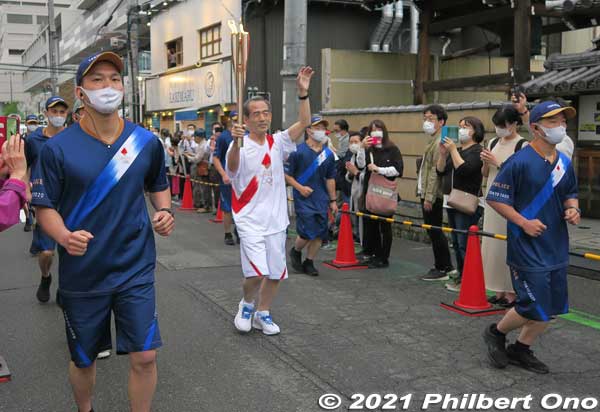
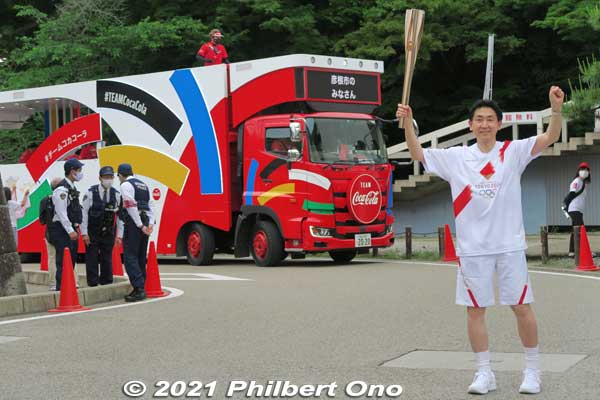
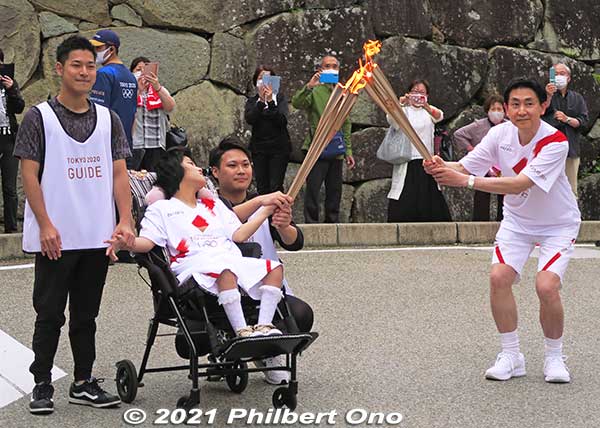
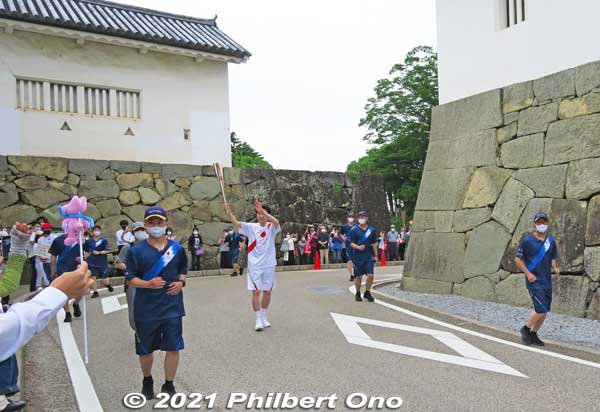
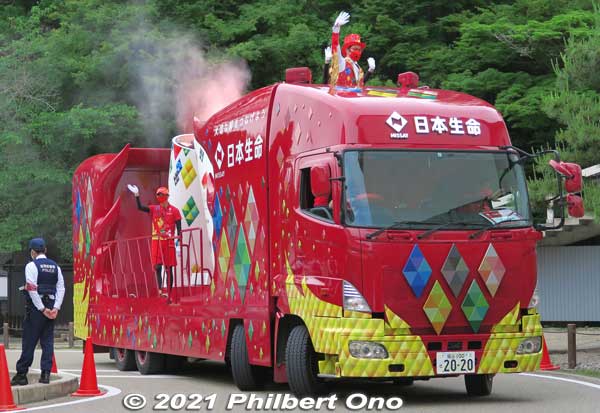
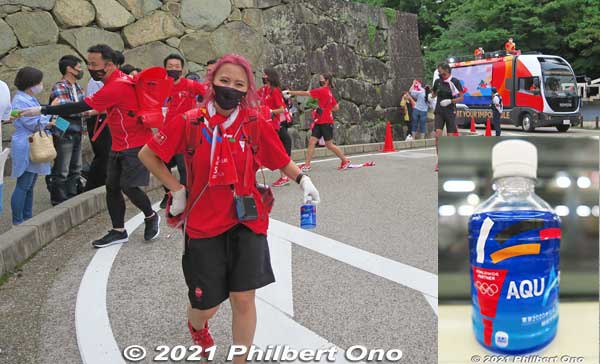
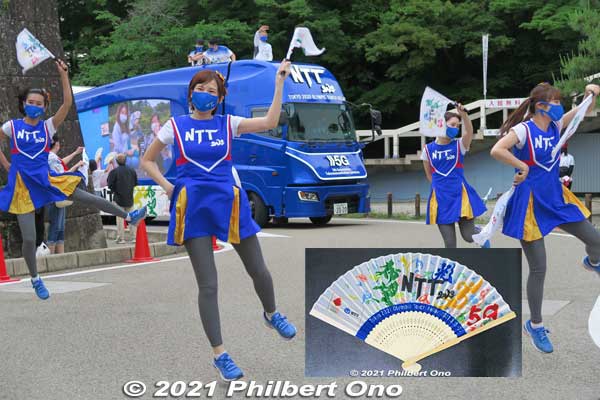
A: At the start of the relay leg, the first runner’s torch is lit from the mobile lantern flame with a small wand.
B: The torch bearer is escorted by running police in navy blue. The torch passes by for only 2 seconds.
C: While standing by, a runner poses for onlookers as the Coca-Cola truck approaches.
D: Passing the flame to the next torchbearer (right).
E: Running through a castle. Each torch runner runs only 200 meters or so. The staff always plead to the crowd, “Don’t chase the torch runner.” Only the family of the runners were allowed to chase the runner in parallel. They wore a white bib.
F: Torch relay has many eye-catching vehicles. Sponsor trucks are entertaining.
G: Lots of freebies for onlookers. Coca-Cola gave out their sports drink (inset) having a torch design.
H: NTT gave out free folding fans (inset).
*Most common comment by torch runners: “Due to the pandemic, I had some anxiety and wondered if I should do it or not. But after running with the torch, I felt really happy I did it!! Extremely rare experience and unforgettable memories!!”

Late March 2021 – April 2021: With numerous online want ads, Japanese event companies recruit part-timers and temp workers for Tokyo 2020. Job ads do not mention “Olympics/Paralympics” by name, but they strongly hint that it is for the Olympics: “Huge international sporting event in Tokyo this summer,” “rare and memorable opportunity,” and “once in a lifetime chance!” The work dates coincide with the Games. No experience necessary and simple training to be provided.
Available jobs include:
・Venue/event/concert staff (crowd control, guide spectators to their seats, check staff accreditation to enter the venue, information desk, take people’s temperature, guide disabled people to transportation, venue setup and cleanup).
・VIP pavilion staff for foreign guests (receptionist, information desk, cloak room, guide to tables, serve drinks, translator/interpreter, English required; minimum TOEIC score 700).
・Ticket office staff at Olympic venues (which means there may be plans to sell tickets during the Games). Venues include the Olympic Stadium, Olympic Village, and Baji Koen (Equestrian Park).
・Warehouse/inventory staff (inspect, sort, and ship out goods). Goods include apparel, stationery, masks, hand sanitizer, and packaged snacks.
The jobs pay ¥1,200 to ¥1,800/hour, higher than minimum wage (¥1,000/hour in Tokyo). Commuting expenses and lunch/dinner usually included. Some of the jobs (like those at Olympic venues) will even provide a “nice uniform” that you can keep afterward.
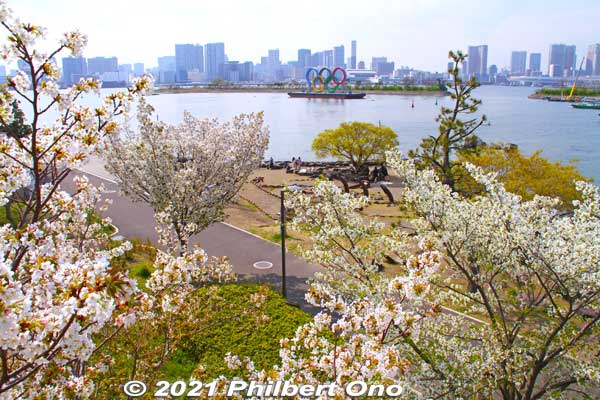
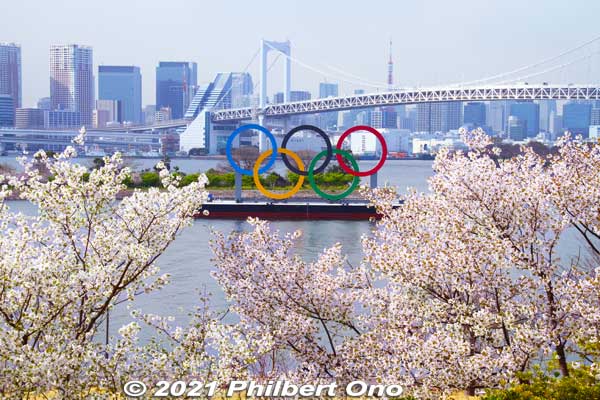
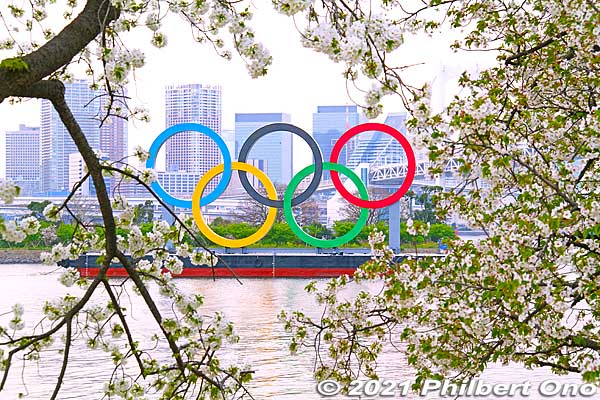
APRIL 2021
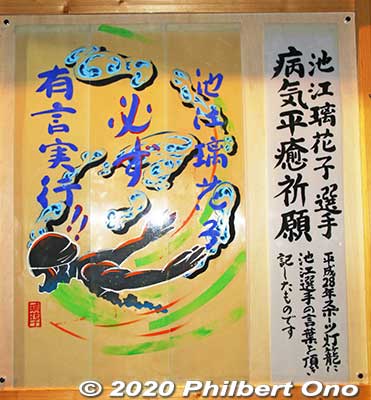
April 4, 2021: By winning the 100-meter butterfly at Japan’s national swimming championship, Japanese swimmer Ikee Rikako qualifies for the Tokyo Olympics medley relay. The Japanese public is taken by her astounding comeback following her battle with leukemia starting in February 2019. Much welcomed positive news.
Later on May 7, 2021, Ikee tweets that she received messages and comments on Twitter urging her to drop out or urge the organizer to cancel the Olympics. While acknowledging the opposition to the Games, she states that that athletes will accept whatever decision is made and do their best if the Games are held.
April 4, 2021: Wheelchair rugby test event that was postponed is held at Yoyogi National Stadium. Closed to the public.
Early April 2021: FINA test events and Olympic qualifiers for diving scheduled for April 18-23 and artistic swimming on May 1-4 are canceled. Water polo test event on April 10–11 is also canceled because overseas officials are unable to enter Japan due to COVID-19 countermeasures. The Olympic marathon swimming qualifier in Fukuoka in late May is also canceled.
Test events in 2021 are later rescheduled. Aquatics test events are rescheduled for May and June, volleyball on May 1st–2nd at Ariake Arena, artistic swimming on May 1st–4th, marathon in Sapporo on May 5, and athletics at the Olympic Stadium on May 9, 2021. All test events are closed to the public.
April 6, 2021: North Korea announces that it will not participate in the Tokyo Olympics to protect its athletes from the pandemic. As punishment, the IOC later in September 2021 bans North Korea from participating in Beijing 2022.
April 6, 2021: Shimane Prefecture Governor Maruyama who initially wanted to cancel the torch relay, decides to hold it.
April 13–14, 2021: Seeing a record number of cases (1,000+/day), Osaka Prefecture decides to take the torch relay off public roads and hold it at Expo ’70 Commemorative Park closed to the public. Only the torch runners’ family members (up to 4 people each) are allowed in. All the runners are still happy to run with the torch.
🍀April 13, 2021: Three months before the Games, some Field Cast volunteers remain skeptical, anxious, or worried over the Games with regard to Covid amid negative media coverage. https://edition.cnn.com/2021/04/13/sport/japan-covid-tokyo-olympics-100-days-dst-intl-hnk/index.html
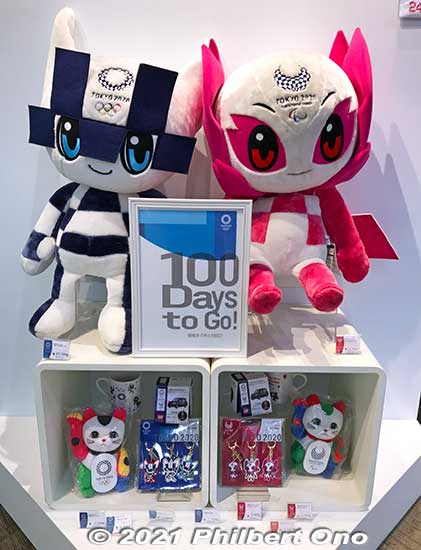
April 14, 2021: To mark “100 Days to Go!” on this day, a set of large Olympic rings are unveiled on Mt. Takao in western Tokyo, new pair of official mascot sculptures at TMG in Shinjuku is unveiled by Tokyo Governor Koike, and new outdoor banners at a few venues like Kashima (soccer) are put up. https://www.metro.tokyo.lg.jp/english/governor/act/2021/0414.html
Organizers continue to insist that they would hold a “safe and secure” Games.
Meanwhile, Tokyo Medical Association chairman Ozaki Haruo warns against holding the Olympics amid the COVID-19 spike: “If infections spread further, it would be difficult to hold the Olympics in its regular form with athletes from various countries, even if there are no spectators,” as he tells Japanese sports paper Sports Hochi.
🔴 April 15, 2021: Nikai Toshihiro, the powerful secretary-general of Japan’s ruling Liberal Democratic Party and kingmaker behind Suga Yoshihide becoming prime minister, says canceling the Tokyo Olympics could be an option if the pandemic spreads further. He later tries to backtrack, but his remarks makes major headlines in Japan and around the world, causing undue alarm.
At a press conference soon afterward, TOCOG President Hashimoto flatly denies any thoughts of cancellation.
At this point, the only question remaining was whether to allow spectators or not.
🍀April 22, 2021: Volunteer leader training starts online. First day with two sessions has 310 volunteer leaders total online. More sessions to follow. There are 6,000 volunteer leaders.
April 22, 2021: Third state of emergency for Tokyo, Osaka, Kyoto, Hokkaido, and several other prefectures takes effect until early May, but extended to June 20, 2021.
April 22, 2021: Rugby operational test event held at Tokyo Stadium. Closed to the public.
April 24–25, 2021: READY STEADY TOKYO swimming test event held at Tokyo Aquatics Centre. Closed to the public. Tokyo 2020 test events are restarted with no spectators.
April 25, 2021: READY STEADY TOKYO track cycling test event held at Izu Velodrome. Closed to the public.
April 26, 2021: READY STEADY TOKYO Paralympic swimming test event held at Tokyo Aquatics Centre. Closed to the public.
April 28, 2021: The five organizers agree to decide on the number of allowable spectators in June depending on the spread of the coronavirus variant.
April 28–May 10, 2021: Second version of playbooks (PDF files) specifying Covid countermeasures and rules are issued.
April 2021: Torch relay continues not exactly as planned, but it attracts crowds most everywhere, especially at the starting and ending ceremonies. More municipalities decide to take it off public roads.
Many Tokyo 2020 official stores open or reopen in and outside Tokyo.
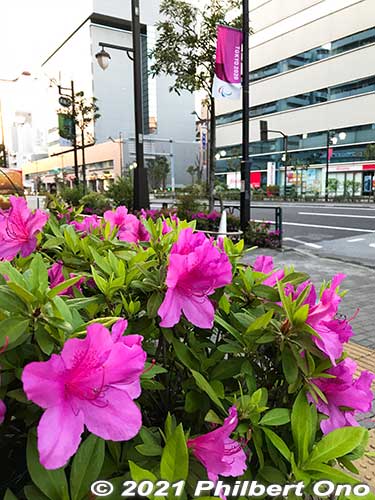
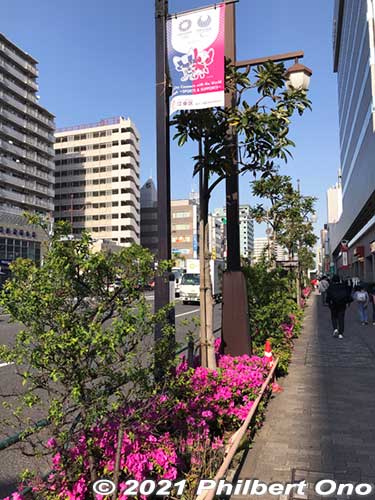
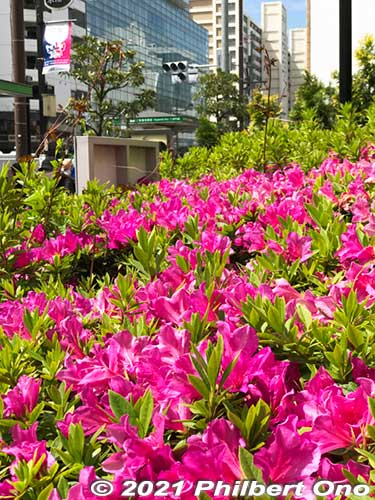
🔴 Although many people are not convinced, at this point, a super spreader seemed unlikely because:
・Everyone from overseas would have to be tested for Covid before and after arrival in Tokyo. Periodic or daily testing would also be required.
・No overseas spectators would be allowed into Japan. Most overseas volunteers would also be kept out.
・Any infections would likely be detected and isolated early.
・Most everyone in Japan would wear a mask.
・All the basic safety measures would be in place.
・Vaccinations would keep progressing.
・The Japanese government and TOCOG would do all they can to minimize the risk. They know the virus is out there, they know how it spreads, and they know how to reduce the risk of infection.
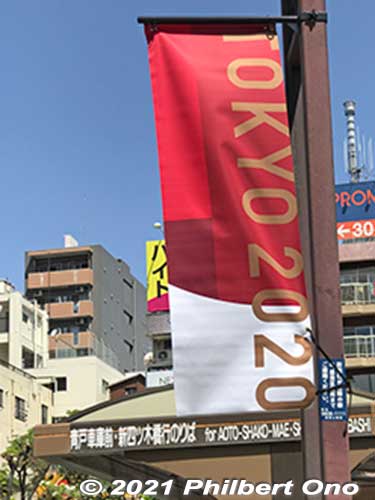
🔴 Ample evidence of widespread Japanese public support for Tokyo 2020:
・In July 2020, pro-Olympics Tokyo Governor Koike won reelection by a landslide against rivals opposing the Games. She captures 3,661,371 votes or 60 percent of the vote. Her closest rival, Utsunomiya Kenji (who later started an online petition to cancel the Games), won only 844,151 votes (13.8 percent of the vote).
・Only a small percentage of ticket holders in Japan have requested refunds.
・Torch relay still sees crowds most everywhere. Very few of the 10,000+ torch bearers have withdrawn (mostly celebrities who probably do not want to attract crowds).
・Among the 80,000 Games volunteers, only a minority have withdrawn. (Reported to be 1,000 so far, and later revealed to be 10,000, still a small minority.)
・Everyone in Japan is happy to see swimmer Ikee Rikako qualify for Tokyo.
・Even the most negative public opinion polls have shown only a minority (30–35 percent) who think the Games should be canceled. Another 30 percent or so thinks the Games should be postponed again. Public opinion polls keep providing the impossible “Postpone again” choice to respondents to inflate negative responses.
🔴 Another postponement is simply not possible for the following reasons given by TOCOG:
- There is no suitable year to postpone it to (2022 is Beijing, and 2023 is only one year before Paris).
- After qualifying for the year 2020, athletes cannot maintain their peak performance for that long.
- The Olympic Village in Harumi cannot be put on hold any longer. Additional construction and renovations need to proceed and condo owners want to move in.
MAY 2021
🍀Early May 2021: Games volunteers receive their volunteer shift schedule and start making reservations to pick up their uniform and accreditation card by late June. People who live in Japan far from pickup locations are disappointed that the uniform will not be shipped to them. Problem is later resolved when the pickup deadline is extended to August to enable volunteers to pickup their uniforms after arriving in Tokyo for the Games.
May 1, 2021: In Kagoshima Prefecture, six staff members who helped with the torch relay in April are found to be infected with the coronavirus.
May 1–2, 2021: Volleyball Japan International Friendship Games – Tokyo Challenge 2021 test event held at Ariake Arena. Closed to the public.
May 2, 2021: Negativity continues to spread in the mass media and social media due to the lingering uncertainty and lack of information. TOCOG never does a good job at communicating pertinent and convincing information to the public and media. That the Games can be held safely. Many people only imagine the worst case scenario based on speculation and dark imagination. https://www.nytimes.com/2021/05/02/world/asia/olympics-volunteers-coronavirus.html
By late May, false rumors about the imminent cancelation of Tokyo 2020 spreads on social media with the assumption that late May would be the last chance to cancel the Games.
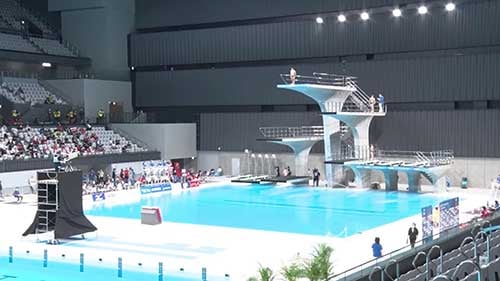
🔴 May 1st–6th, 2021: FINA Diving World Cup 2021 test event and Olympic qualifier is held successfully at Tokyo Aquatics Centre (TAC) without spectators. The first time a test event is held with foreign athletes (46 countries) since the pandemic started. Total 225 divers competed with China and Australia absent.
Since test events require athletes and staff from overseas to enter Japan, it takes much time and effort to ensure their entry to Japan and safety against infections.
・Very strict protocols implemented for athletes and staff. They are PCR-tested within 72 hours before departure to Japan. Then tested again upon arrival at the airport in Tokyo and tested a third time 3 days after arrival. They are also tested regularly during the competition. This allows them to skip the two-week quarantine.
・Athletes and staff stay at a hotel near the Aquatics Centre. The hotel is a bubble for them as they are isolated from other hotel guests. They use a back entrance and occupy entire hotel floors (two). They have their own elevator stopping only on their floors. Everyone has their own room, no roommates. Take-out meals are brought to the floor’s elevator hall where each athlete would come and pick up their meal. They eat alone in their room. They are not allowed to go out of their hotel other than to the Aquatics Centre by dedicated bus.
・The number of hotel staff working on the athletes’ floors are minimized to only 13 and they are also PCR tested twice during the athletes’ stay at the hotel.
・The press is not allowed to enter the poolside. They are kept away from the athletes.
・One Japanese male diver developed a sore throat and withdrew. He had tested negative, and it turned out to be tonsillitis.
・To makeup for the diving test event being held without spectators, a backyard tour online is provided.
May 4, 2021: Gymnastics operational test event held at Ariake Gymnastics Centre. Closed to the public.
May 5, 2021: Sapporo Marathon Festival 2021 test event held successfully at Sapporo Odori Park. It sees 94 athletes from five countries, including six from overseas. Operational staff numbered 2,700.
May 5, 2021: Japanese lawyer and two-time unsuccessful Tokyo gubernatorial candidate Utsunomiya Kenji starts an online petition at change.org named “Cancel the Tokyo Olympics to protect our lives.” The petition quickly garners numerous signatures and much media attention. It eventually receives about 460,000 signatures from Japan and overseas, but nowhere near a majority of signatures from Tokyo residents (14 million). No petition nor protest against other sporting events (baseball, soccer, sumo) being held in Japan with spectators.
🔴 May 6, 2021: IOC announces that Pfizer will donate its COVID-19 vaccine for 20,000 Japanese athletes and Tokyo 2020 staff.
May 8, 2021: READY STEADY TOKYO rhythmic gymnastics test event held at Ariake Gymnastics Centre. Closed to the public.
May 9, 2021: READY STEADY TOKYO athletics test event held at Olympic Stadium. It sees 350 athletes from seven countries and regions. Closed to the public.
May 10, 2021: IOC President Thomas Bach‘s planned visit to Japan in mid-May is postponed due to Tokyo’s coronavirus state of emergency extended until the end of May 2021 amid a fourth wave of infections. He had planned to participate in a torch relay event in Hiroshima on May 17. He eventually visits Hiroshima on July 16, 2021.
May 11, 2021: READY STEADY TOKYO Paralympic athletics test event held at Olympic Stadium. Closed to the public.
May 2021: Tokyo Marathon volunteers are asked to be volunteers for the Olympic cycling road race from Tokyo to Shizuoka.
Shizuoka Prefecture reports a shortage of torch relay volunteers for June 23–25. They need 1,600 volunteers, but got only 1,300.
In most torch relay municipalities, out-of-town torch relay volunteers are being declined to take part in volunteer activities. Torch relay volunteers are being limited to local residents.
Field Cast Games Volunteer Uniform
🍀May 12, 2021: After making reservations, volunteers start to pickup their official uniforms and accreditation card(s). Uniform pickup locations are only in prefectures where there are Olympic or Paralympic venues: Tokyo, Shizuoka, Tohoku, and Sapporo. Nothing in western Japan, not even in Osaka.
In Tokyo, the uniform pickup site is UAC (Uniform Accreditation Center in the old Hotel Okura) near Kamiyacho Station. It has a fitting room to try on the actual uniform (shirts, pants, sneakers, etc) for size. Volunteers could change their uniform size if necessary. https://www.volasapo.tokyo/fa_interview/13/

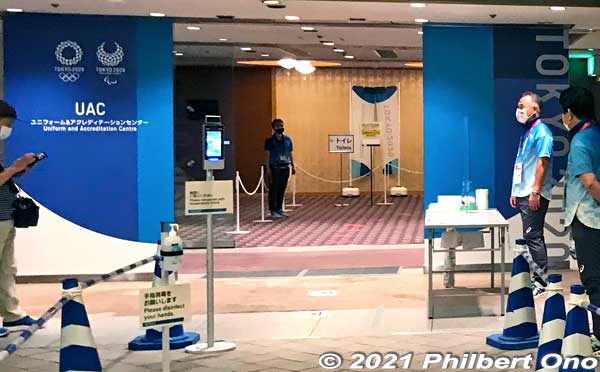
Volunteers are required to pickup the uniform in person so their photo ID and face can be checked on site. (No shipping of uniforms.) Those who live far away from pickup locations complain about the travel distance and expense. Also, the state of emergency in some prefectures discourages traveling outside the prefecture. TOCOG later extends the uniform pickup period to August 5. This allows volunteers from afar to pickup the uniform when they arrive in Tokyo for the Games.
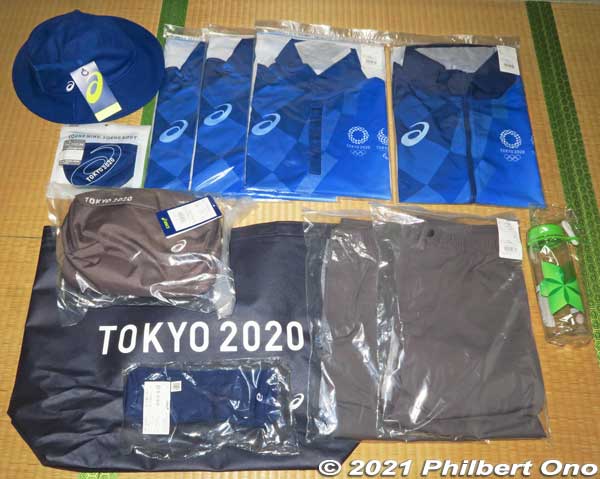
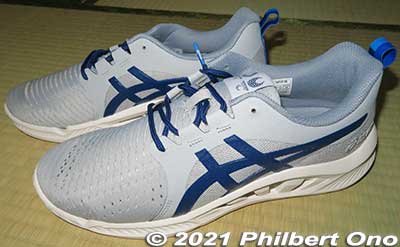
🍀The volunteer/staff uniform is made by ASICS and all items are branded with “Tokyo 2020.” Volunteers received the following:
Polo shirts: 3
Jacket: 1
Long pants/shorts (gray): 2
Sneakers (custom designed for Tokyo 2020): 1 pair
Ankle socks (navy blue): 2 pairs
Wide-brimmed hat (navy blue): 1
Masks imprinted with “Tokyo 2020” (navy blue): 2
Waist bag (gray): 1
VISA prepaid card (¥1000): 1
Plastic water bottle 500ml (from Coca-Cola): 1
Field Cast Pocket Guide: 1
Field Cast Support Guide (Japanese): 1
Field Cast Support Guide (English): 1
Field Cast Handbook (optional, Japanese or English version): 1
Field Cast notebook: 1
Small tote bag (blue) containing the booklets above: 1
Large, black tote bag to carry everything above (60cm wide x 40cm high, black): 1
May 13–14, 2021: READY STEADY TOKYO skateboarding test event held at Ariake Urban Sports Park. Closed to the public.
May 14–16, 2021: READY STEADY TOKYO 3×3 basketball test event held at Aomi Urban Sports Park. Closed to the public.
May 14, 2021: Olympics minister Marukawa Tamayo announces that 45 municipalities in Japan have canceled plans to host athletes for pre-Olympic training camps and cultural exchanges due to pandemic concerns.
She adds that 32 of the 45 municipalities said they were notified by their prospective athlete guests that they would cancel their training camp plans.
As of late April 2021, 528 municipalities in Japan were registered to welcome athletes from 184 countries and regions for pre-Olympic and Paralympic training camps.
May 14, 2021: In an interview with CNN, Rakuten Group CEO and chairman Mikitani Hiroshi says that holding the Tokyo Olympics during the pandemic would be a “suicide mission.” (Rakuten is not a Tokyo 2020 sponsor, and there were no COVID-19 deaths at Tokyo 2020. Rate of Covid-19 infection within Tokyo 2020 turned out to be extremely low.)
Later in June 2021, Tanaka Masahiro, pitcher for the Rakuten Eagles, is selected for the national baseball team which went on to win the gold medal at the big event his employer called a “suicide mission.”
May 17, 2021: READY STEADY TOKYO BMX freestyle cycling test event held at Ariake Urban Sports Park. Closed to the public.
May 17–21, 2021: READY STEADY TOKYO shooting test event held at Asaka Shooting Range. Closed to the public.
May 18, 2021: An oppositionist column in the Los Angeles Times titled “Olympics must be canceled after Japanese flip from fans to protesters amid COVID strain” ends with the sentence: “As catastrophic as it will be to call off the Olympics, the alternative figures to be worse.” (The sports writer of this column, Dylan Hernández, later attends the “worse than catastrophic” Tokyo 2020 Olympics and has fun in Japan while safely reporting the Olympics.)
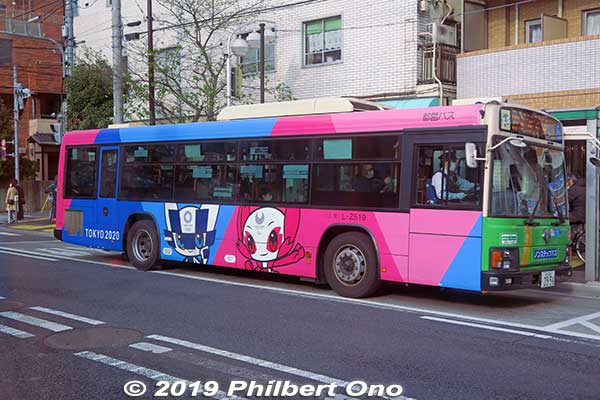





🍀May 18, 2021: At a routine press conference, Olympics Minister Marukawa finally makes an official comment about Covid testing for volunteers.
Media members and volunteers who will be near athletes within 1 meter for 15 min. or longer will be required to be Covid-tested (saliva) every day. The test can be done on the night before instead of the early morning. Daily testing will be required for volunteer interpreters and vehicle drivers for athletes.
Other volunteers who interact with athletes are to be tested every 4 or 7 days.
🍀Mid-May 2021: Venue-specific online training is held for Olympic Village (NCS) volunteers. MS Teams and Powerpoint presentation for about 1 hr. 45 min. (including a 10-min. break). During the last 10 min., Q&A is held via the chat feature.
May 20, 2021: During a videoconference with TMG, IOC President Thomas Bach states that he expects more than 80 percent of Olympic Village residents to be vaccinated. He also reiterates that Tokyo 2020 would not be canceled, citing other sporting events that proved that the sports events could be held safely with COVID countermeasures.
May 21, 2021: During an online press conference, IOC Vice President John Coates is asked if the Games would still proceed even if Tokyo was still under a Covid state of emergency. He cites the athletics and diving events held successfully in May 2021 and replies, “The answer is absolutely yes” which draws criticism on social media in Japan.
May 22, 2021: Expressing his opposition to the Tokyo Olympics, SoftBank founder and CEO Son Masayoshi tweets in Japanese opposing the Olympics including, “Currently more than 80% of people want the Olympics to be postponed or canceled. Who and on what authority is it being forced through?” (SoftBank is not a Tokyo 2020 sponsor, and the claim that 80% of people want the Olympics to be postponed or canceled is dubious.) https://twitter.com/masason/status/1395955033036918785
Later in June 2021, Yanagita Yuki, outfielder for the Fukuoka SoftBank Hawks, is selected for the national baseball team which went on to win the gold medal at the event his employer described as being “forced through.”
May 22, 2021: Addressing a meeting of the International Hockey Federation, IOC President Thomas Bach states: “The athletes definitely can make their Olympic dreams come true. We have to make some sacrifices to make this possible.”
This was mistranslated into Japanese, implying that Japan would have to make Covid sacrifices even in human lives. The mistranslation/misunderstanding creates anger on social media in Japan.
May 24, 2021: Mass vaccinations (Moderna) finally starts in Japan for elderly people.
May 24, 2021: Although foreign tourists still cannot enter Japan, the US State Department issues the most serious “Level 4: Do Not Travel” advisory against US citizens traveling to Japan due to the sharp increase in Covid-19 cases. Two weeks later on June 8, it was lowered to “Level 3: Reconsider Travel.” It does not apply to US athletes traveling to Japan for Tokyo 2020.
May 26, 2021: TOCOG reveals the breakdown of Tokyo 2020 participants arriving from overseas. Before the postponement, the number was 177,700. This was reduced by more than half to 78,000 (59,000 Olympic participants and 19,000 Paralympic participants).
The people who were cut included 30,000 friends and family members of athletes and 61,700 family members of IOC members and guests of sponsors.
However, the number of IOC, IPC, NOC, and NPC staff and members remain unchanged with 3,000 Olympic Family (IOC) members, 2,000 Paralympic Family (IPC) members, 14,800 NOC members, and 5,900 NPC members. (Later in June 2021, TOCOG announces substantial reductions of IOC, IPC, NOC, and NPC staff and members.)
May 26, 2021: Japanese newspaper Asahi Shimbun, an official sponsor of Tokyo 2020, publishes an editorial urging the Olympics to be canceled due to public health risks and strains on the medical system. (Such concerns turn out to be unwarranted.)
May 26, 2021: After bashing Tokyo 2020 all these months with scathing articles and editorials/opinions, the Washington Post flip-flops with articles supportive of the Tokyo Olympics: https://www.washingtonpost.com/opinions/2021/05/26/world-needs-tokyo-olympics-they-can-should-go-forward-safely/
May 27, 2021: Ueyama Naoto, chairman of the Japan Doctors Union, says the Tokyo Olympics could produce an “Olympic” coronavirus strain. (Never did.)
JUNE 2021

🔴 June 1, 2021: The first Olympic athletes arrive in Tokyo. Australia’s Olympic women’s softball team (“Aussie Spirit”) start their quarantine before their 1.5-month pre-Games training camp in Ota, Gunma Prefecture.
They are to play 23 practice games with various teams, including Japan. The fact that the Olympics will actually happen finally hits home with their arrival. https://olympics.com/en/news/the-first-team-to-land-in-japan-speak-about-olympic-preparations
The Australians and the city of Ota already know each other quite well since the Australian team has been based in Ota during previous tournaments in Japan in previous years. They like the facilities in Ota. It’s like “home away from home” for the Australians. Ota is where Subaru has its main automotive factories as well as the Subaru car museum and factory tour (SUBARU Visitor Center).
The Mayor of Ota, Shimizu Masayoshi, also stated, “Ota may be able to prove that host town activities can be done safely.” He also wants Aussie Spirit to medal, but no higher than Silver because he wants Japan to get the Gold (which they did).
As of late May 2021, Japan has 528 host towns for national teams from overseas to train and meet local residents. However, due to pandemic difficulties or fears, 105 host towns (or national teams) have given up their host town training camp plans due to COVID-19 fears or expenses.
June 1, 2021: With Covid vaccine donated by Pfizer, the inoculation of 20,000 Japanese Olympic athletes, coaches, and staff begins.
🍀June 2, 2021: TOCOG announces that about 10,000 of 80,000 Games volunteers have dropped out. This includes the 1,800 overseas volunteers forced to withdraw and the 1,000 who quit soon after TOCOG President Mori’s sexist remarks in February 2021. Volunteers who withdraw still have the option to rejoin.
TOCOG does not keep statistics on the reasons for the volunteers withdrawing, but the postponed dates and Covid fears are likely to be the main reasons.
TOCOG says it will not affect operations, and there are no plans to recruit more volunteers.
🍀Meanwhile, the withdrawal rate among City Cast volunteers is much higher, at least 20 percent to 35 percent. City Cast volunteers mostly started quitting after overseas spectators were not allowed to enter Japan. City Cast were recruited by prefectures having a Tokyo 2020 venue.
Chiba Prefecture, with Narita Airport, recently reported that 30 percent of their 2,826 City Cast volunteers have withdrawn. Before Covid, Chiba aimed to select 3,000 out of 6,500 who applied.
In Miyagi Prefecture, almost half of their 1,700 City Cast volunteers have quit. They now have 910.
In Yamanashi Prefecture where the cycling road race will be held, 85 of their 163 City Cast volunteers have withdrawn. However, their original target for volunteers was only 100, but 163 applied.
June 2, 2021: TMG cancels the Yoyogi Park live site for public viewing of the Games.
June 3, 2021: TOCOG unveils the victory ceremony podium, the fan-shaped trays to carry the medals to medalists, and the costumes to be worn by medal tray bearers at the Olympics and Paralympics victory ceremonies. The podium is made of recycled plastics and fabricated with a 3D printer.
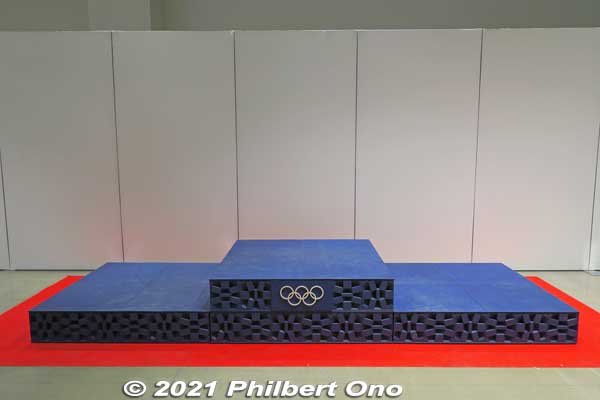

🔴 June 4th–6th, 2021: National public opinion poll taken by Yomiuri Shimbun newspaper indicates 50% in favor of holding the Games and 48% who want it canceled.
Of the 50% in favor, 24% want to limit the number of spectators and 26% want no spectators. In May, Yomiuri found 59% wanted the Games to be canceled. Now it’s 11% less.
June 8, 2021: TOCOG President Hashimoto states that media members from overseas will be required to undergo a two-week quarantine after arrival and movements to be recorded with GPS in case there is any infections or problems.
June 8, 2021: Thomas Bach announces the IOC Refugee Olympic Team’s 29 athletes from 11 countries representing 12 sports who will be competing at Tokyo 2020.
June 11, 2021: International Weightlifting Federation announces that New Zealand weightlifter Laurel Hubbard (43) qualified to compete at Tokyo 2020 (women’s +87 kg division) as the first transgender woman athlete (formerly competing in male events) at the Olympics.
June 13, 2021: The Group of Seven nations at the G7 summit in Cornwall declare their support for the Tokyo Olympics.
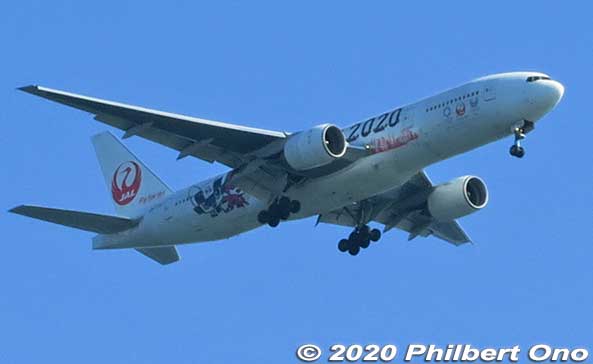
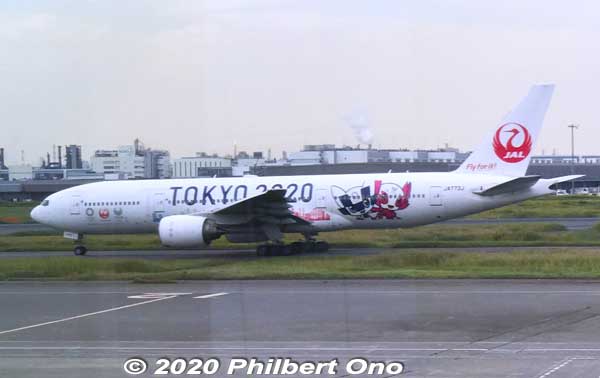
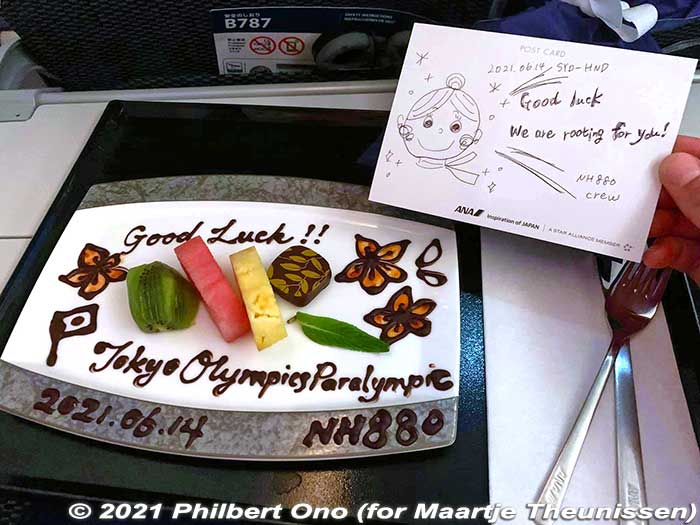
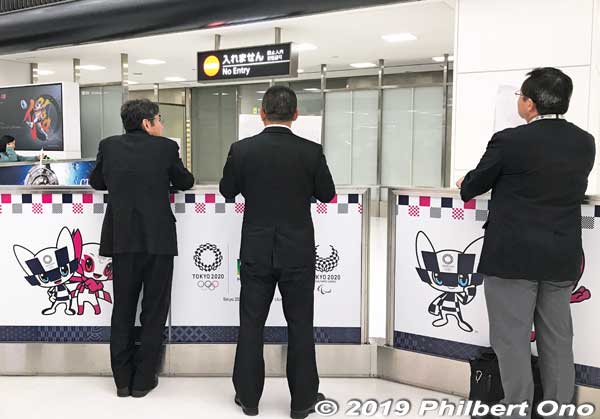
June 15–22, 2021: Third and final version of playbooks (PDF files) are issued. https://olympics.com/ioc/tokyo-2020-playbooks
🍀June 15, 2021: More Games volunteers go on record to express their anxiety and serious doubts about the Games, drowning out optimistic volunteers who are actually in the majority and proved to be right about Tokyo 2020 not becoming a COVID-19 super spreader: https://edition.cnn.com/2021/06/15/asia/japan-olympic-volunteers-intl-hnk-dst/index.html
June 17, 2021: The Japanese government ends Tokyo’s state of emergency.
Tokyo 2020 Coronavirus Vaccination Program
🍀June 8, 2021: Following a TOCOG board meeting, TOCOG CEO Muto Toshiro announces that they want all 70,000 Games volunteers and Japanese media members to be vaccinated.
He says it was definitely feasible, and they are negotiating to procure more Pfizer vaccines. Also working on the logistics to get enough medical personnel and vaccination centers without affecting ongoing vaccinations for the general population. They may use existing or corporate facilities to vaccinate volunteers and media members.
June 9, 2021: TOCOG President Hashimoto states that domestic media members will also be required to be vaccinated. Like the Japanese athletes, they will be provided with the Pfizer vaccine for free.
June 15, 2021: Pfizer provides COVID-19 mRNA vaccine for another 20,000 Tokyo 2020 participants. Totaling 40,000 so far.
June 17, 2021: With Covid vaccine donated by Pfizer, the inoculation of 600 Japanese Paralympic athletes, coaches, and staff begins.
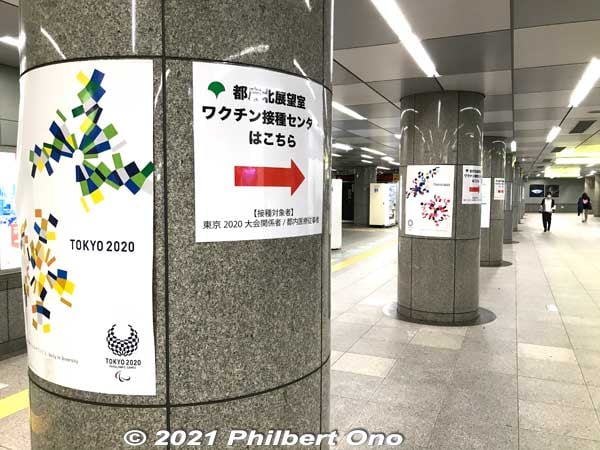
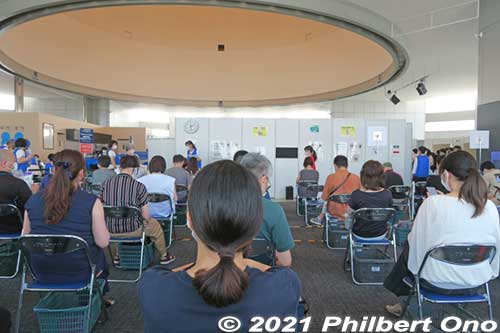
Left: At Tochomae Station, signs point the way to TMG’s mass vaccination center.
Right: Tokyo Metropolitan Government’s 45th-floor North observation deck becomes a mass vaccination center for priority Tokyo 2020 staff and volunteers. This is the 15-min. waiting/observation area after getting vaccinated.
🍀June 18–August 21, 2021: Tokyo Metropolitan Government’s 45th-floor North observation deck in Shinjuku opens as a vaccination center for Tokyo 2020 employees, volunteers, and contractors to receive their first and second Pfizer doses. From June 18, 2021, a total of 40,000 people connected to Tokyo 2020 are vaccinated at TMG with Pfizer vaccines donated by the IOC. The second shot started to be given from July 9, 2021 at TMG.
So far, about 9,000 volunteers to be working near athletes are selected for priority vaccination such as:
・Athlete village staff
・NOC/NPC assistants
・Competition staff
・Airport staff
・Doping staff
Eventually, the 40,000 vaccinated people consisted of the following:
Japanese athletes and staff: 2,200
Sports directors: 1,300
Games staff (paid staff, volunteers, contractors, etc.): 30,000 (including 14,300 volunteers)
Media: 5,000
By area or specific location/occupation, the 40,000 vaccinated people were as follows:
Competition venues: 16,800
Olympic Village: 3,000
NOC/NPC assistants and interpreters: 2,100
Transportation and airport: 3,000
Medical and anti-doping: 2,000
Food and beverage: 2,000
Japanese media: 6,400
Security: 2,000
TOCOG CEO Muto Toshiro initially stated that they were having difficulty procuring vaccines for all 70,000 volunteers. Therefore, no vaccines yet for 50,000 remaining volunteers.
Fortunately, for the 50,000 remaining unvaccinated volunteers, TMG belatedly secures Moderna vaccines for the first shot given during June 30 to July 3 at Tsukiji and the second shot during July 31 to August 11, 2021. It was too late for many people, but better late than never. It would be effective for Paralympic volunteers.
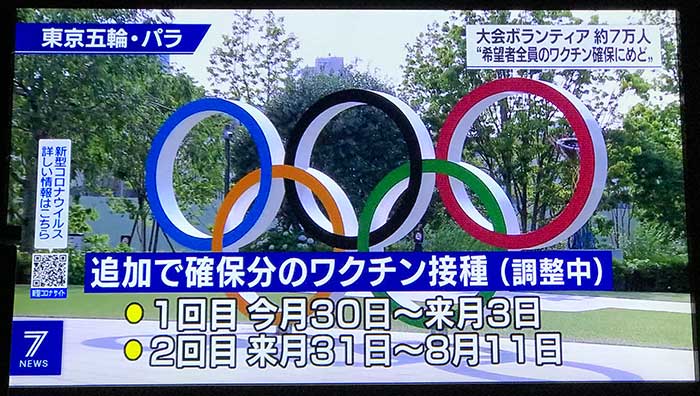
June 18, 2021: TOCOG announces substantial reductions of IOC, IPC, NOC, and NPC staff/members coming to Japan. The 3,000 Olympic Family (IOC) members have been reduced to 1,200, the 2,000 Paralympic Family (IPC) members to 400, and media members from overseas have also been reduced. The total number of Olympic people will then be 41,000, and Paralympic people 12,000. The total of 53,000 is much less than the reduced number of 78,000 announced in May 2021 and less than one-third the original number of 177,000.

June 19, 2021: Uganda becomes the second national team to arrive for the Tokyo Olympics. However, at Narita Airport, one of the coaches tests positive for Covid-19 and is put in isolation. After the remaining eight Ugandans went on to Izumisano, Osaka for their training camp, another member tests positive.
June 20, 2021: Tokyo’s third state of emergency, in effect since May 7, is lifted in time for the Games.
June 21, 2021: The five organizers announce that up to 10,000 spectators will be allowed at each venue or only 50 percent of venue capacity, whichever is less. Also, only 20,000 at the Opening Ceremony. Subject to change depending on any state of emergency. (All spectators are eventually banned.)
June 21, 2021: India’s National Olympic Committee complains to TOCOG about the three-day quarantine period to be imposed on their athletes (and those from ten other countries) after arrival in Japan.
June 22–30, 2021: Tokyo Governor Koike Yuriko is hospitalized for severe fatigue. She apologizes for not being at work during such a critical time soon before the Olympics.
June 23, 2021: TOCOG President Hashimoto announces guidelines for spectator activities. They include a ban on the sale and consumption of alcoholic beverages at venues, no shouting, no high fives, etc.
June 23, 2021: TOCOG announces that about 25 percent of Tokyo 2020 ticket holders in Japan will lose their tickets in order to reduce the number of spectators from 3.6 million to 2.72 million. About 910,000 ticket holders will be disallowed from watching the Games in person.
The unlucky people will be selected in a lottery on July 6. The affected sports include athletics, baseball, football, golf, modern pentathlon, rugby sevens, softball, and surfing. The plan is subject to change (further reduction) depending on the Covid situation and state of emergency in Tokyo. (All spectators are eventually banned and this lottery is never held.)
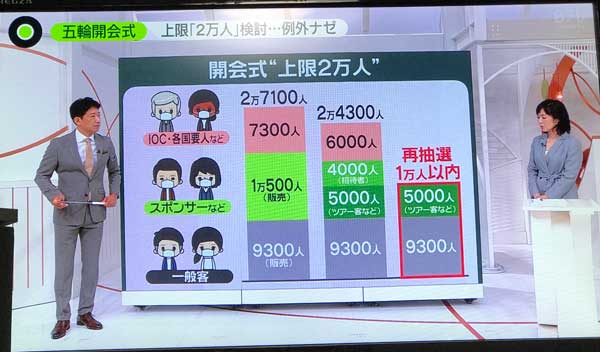
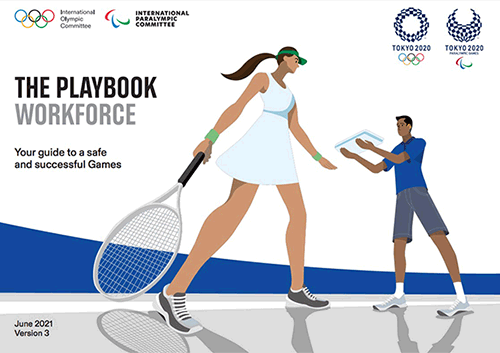
🍀June 23, 2021: Final version of the Workforce Playbook (for volunteers) is released. https://olympics.com/ioc/tokyo-2020-playbooks
June 24, 2021: Imperial Household Agency Grand Steward Nishimura Yasuhiko states that Emperor Naruhito was very concerned about the coronavirus situation and hoped the organizers can work together to prevent the spread of infections and that the Games would not increase the spread of COVID-19 infections.
🍀June 26, 2021: In a major breakthrough, vaccines for all 70,000 Games volunteers have been procured. Moderna vaccine is to be provided to Japan-based volunteers who have not received a Pfizer vaccination notification earlier this month.
June 28, 2021: The White House states that US President Joe Biden will not be attending Tokyo 2020, while his wife Jill is thinking about attending to represent the US government. (She ultimately attends Tokyo 2020.)
🍀 June 30–July 3, 2021: Games volunteers are vaccinated with Moderna at Tsukiji for the first dose. Second dose at Yoyogi Park during July 31 to August 2, 10, 11. Even volunteers overseas who cannot enter Japan receive a notification to get vaccinated in Tsukiji.
Email notifications for unvaccinated volunteers (about 50,000) are sent out. However, only 8,300 opt to get vaccinated. A little late for the Olympics, but in time for the Paralympics.
Late June 2021: Event companies and temp agencies like Pasona continue to recruit paid staff (Japan residents only) for the Games until the end of June. Many job descriptions are similar to volunteer roles and includes managerial jobs.
🍀 Olympic Village Field Cast Training and Tour
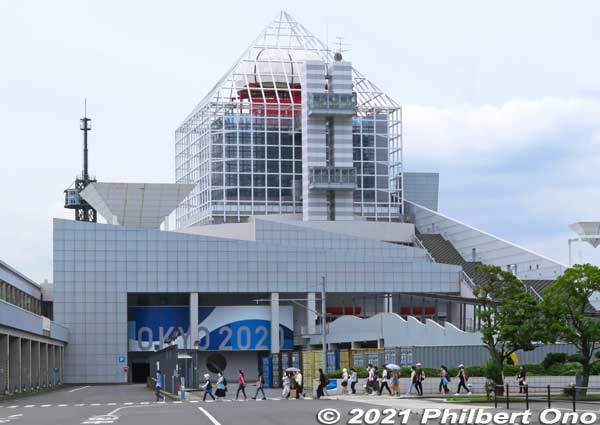
Harumi Passenger Ship Terminal in the Olympic Village serves as the NOC/NPC Services Centre on the 1st to 4th floors. Meeting rooms and rest area for Olympic Village (OLV) volunteers. Rooftop is a lookout deck. The people walking are NOC volunteers going to tour the OLV. (NOC/NPC: National Olympic/Paralympic Committee)
(This terminal closed on Feb. 20, 2022 and was demolished from July 2022 to make way for a new medium-size passenger ship terminal that will be smaller and less costly to maintain.)
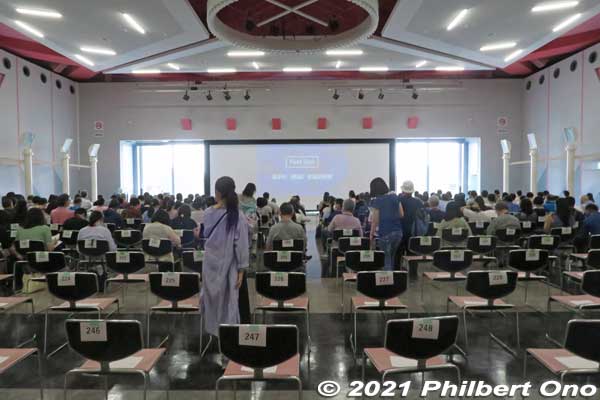
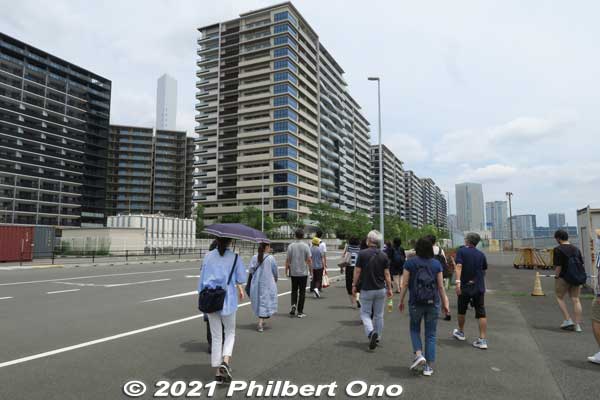

A: Volunteers tour OLV for the first time as part of their training.
B: Volunteers walk along the main road (no flags yet) in the OLV toward the main dining hall.
JULY 2021
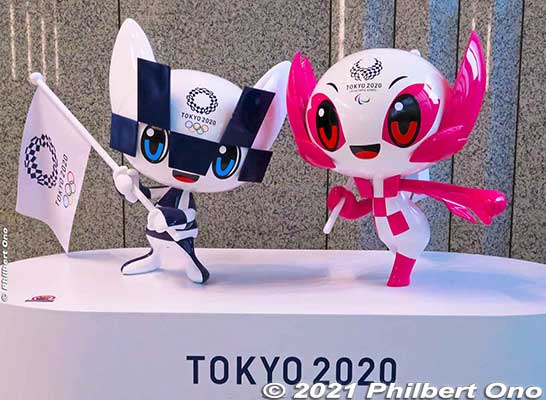
July 8, 2021: IOC President Thomas Bach arrives in Tokyo on a commercial flight on Lufthansa instead of a private jet like he did on his last visit. At the airport, he takes the secret VIP exit and does not appear in the Arrivals lobby where numerous press was waiting.
Like a head of state, Bach’s car from Haneda Airport to his hotel is surrounded by police motorcycles and Japanese Secret Service vehicles. When arriving at his hotel (The Okura Tokyo), he opens the car window to wave to the press. The hotel is guarded by numerous police. Bach isolates in his hotel for the first three days.
🔴 🍀July 8, 2021: After delaying the decision multiple times, the five organizers finally decide to ban even domestic Olympics spectators in Tokyo, Saitama, Chiba, and Kanagawa Prefectures following the Japanese government’s decision to declare another state of emergency. A very sad decision, but better than an outright cancellation.
It is a heavy blow to TOCOG, which would lose the ticket revenue of ¥90 billion ($820 million). It had sold 4.48 million Olympics tickets.
The decision also affects Games volunteers assigned to Event Services (EVS), the department (FA) in charge of guiding and managing spectators.
July 9, 2021: It is announced that spectators would also not be allowed in Hokkaido’s Olympic events.
July 10, 2021: It is announced that spectators would also not be allowed in Fukushima’s Olympic events.
July 10, 2021: Artistic swimming operational test event held at Tokyo Aquatics Centre. Closed to the public.
🍀July 11, 2021: Despite no spectators, TOCOG announces that all remaining 70,000 volunteers will still be retained. No one will be let go. They plan to reassign the extra volunteers to different roles or venues if necessary.
🍀TOCOG CEO Muto Toshiro also states that they want as many volunteers as possible to be involved in the Games, even for a day. This seems to imply that volunteers can work fewer than the minimum number of 10 days that was originally required.
🍀The mayor of Chiba city, where Makuhari Messe (wrestling, fencing, taekwondo) is located, has stated that the city’s City Cast volunteers will be inactivated for the Olympics since there will be no spectators. Chiba city originally had 1,600 City Cast which shrank to 780 due to the postponement and Covid fears. They were to be assigned to train stations and information desks to guide spectators.
🍀Mid-July 2021: It is reported that Tokyo 2020 volunteer uniforms were being sold on auction and flea market sites in Japan for as much as ¥10,000 or more. Apparently, a few volunteers are trying to sell their uniforms in violation of the rules. It also poses a security risk to have unauthorized persons wearing the uniform to the Games. Reseller websites have been informed of this violation. Any volunteers found to be selling a uniform is to be booted out.
Pre-Olympic Training Camps in Host Towns
Despite a number of host towns and national teams abandoning their plans to have training in host towns in Japan, most host towns and national teams went ahead with their plans for July 2021. COVID-19 countermeasures disallowed athletes from mingling with local residents and touring the town freely. Online exchanges were held instead. https://host-town.jp/about/en
July 11–18, 2021: New Zealand’s Olympic rowing team (35 athletes and 18 staff) conduct their successful pre-Olympic training camp at Lake Biwa in the host city of Otsu, Shiga Prefecture (near Kyoto). They stay at the Otsu Prince Hotel and train at the local Seta Rowing Club at Lake Biwa. The team had high praise for their host town: https://mainichi.jp/english/articles/20210713/p2a/00m/0sp/012000c
The public is also invited to watch them rowing on the lake. New Zealand goes on to win the most Olympic medals in rowing with three gold and two silver medals at Tokyo 2020.
Thank you to our dear friends at Seta Rowing Club for a warm and hospitable experience building up to racing. The…
Posted by Rowing NZ on Friday, July 16, 2021
July 16–20, 2021: The city of Makinohara in Shizuoka Prefecture stood firm and remained determined to host the USA surfing team as planned. The city had invited the team back in 2016 and even built a surfing wave pool for their training camp.
The US surfing team arrives Haneda Airport on July 16 and immediately travels to Makinohara for their training camp. They ride local waves at Shizunami Beach as well as on artificial waves at the new Shizunami Surf Stadium. They are also entertained by local firemen acrobatics atop high ladders.
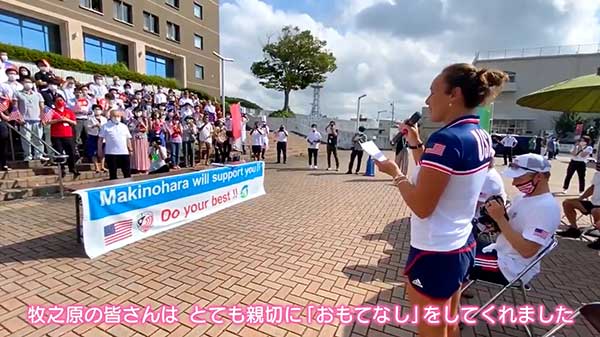
Before the team leaves for Chiba on July 20, Carissa Moore (from Honolulu, Hawaii) gives a thank you speech in Japanese. (She studied Japanese in junior high school.)
Later when Carissa wins the Olympic gold medal at Tsurigasaki Surfing Beach in Chiba on July 27, the cheering people in Makinohara are ecstatic and extremely happy and proud to have been the team’s host town. Duke Kahanamoku, who wished surfing to be an Olympic sport, most likely also smiled from Heaven. Video: https://youtu.be/pAveBUdaJt4
July 12, 2021: Tokyo’s fourth state of emergency starts and covers the Olympics period. Ends on August 22, 2021.
July 13, 2021: The Olympic Village in Harumi opens to athletes and coaches without any opening ceremony. As widely reported, athletes also receive free condoms to be used after they go back to their home countries.
July 15, 2021: Thomas Bach meets with Tokyo Governor Koike and states that there will be zero risk to people in Japan.
July 15, 2021: Thirty-six equestrian horses arrive Narita Airport. Total of 330 equestrian horses for the Olympics and Paralympics are to arrive by mid-August 2021.
July 16, 2021: One of the Ugandan athletes training in Izumisano, Osaka runs away from his hotel after leaving a note that he wants to work in Japan. He is later found in Mie Prefecture on July 20 and requests refugee status. However, he returns to Uganda on July 21.
July 16, 2021: TMG cancels plans to invite school children from the recovering Tohoku Region and Kumamoto Prefecture to spectate at the Olympics in Tokyo.
July 17, 2021: As ordered by the IOC, Team South Korea remove their controversial banners outside their Olympic Village accommodations. They state that the IOC promised that Japan’s rising sun flag would be disallowed at venues.
July 17–18, 2021: American distance runner Paul Chelimo claims on Twitter on July 17 that the cardboard beds in the Olympic Village were anti-sex beds “preventing intimacy among athletes.”
On the next day, Irish gymnast Rhys McClenaghan posts on Twitter to quash the rumor that the cardboard beds are anti-sex by filming himself jumping on the bed. The bed does not break. He says the beds being “anti-sex was fake news.”

July 18, 2021: For the first time, athletes (two) from overseas staying at the Olympic Village test positive for COVID-19. Later, two South African male football players also test positive. (No clusters at the Olympic Village.)
July 18, 2021: Age 30 Uzbek university male student Davronbek Rakhmatullaev (ダヴロンベク・ラフマトゥッラエフ) working as meal delivery staff for the Olympic Stadium press is arrested for raping a Japanese female part-time worker in her 20s at the Olympic Stadium on July 16, 2021. Working part-time for a food company, Rakhmatullaev had delivered meals to the press dining room and the assault occurred at around 9:00 pm in the spectator seats and aisle after they had watched the Closing Ceremony rehearsal that evening. They met for the first time that day and it was her first day on the job. The suspect clams that it was consensual. He has been in Japan since 2014 enrolled at a private university in Aichi Prefecture.
July 19, 2021: The Korean Sport & Olympic Committee announces that it has reserved a hotel near the Olympic Village to prepare their own food for their athletes. They will screen all food for radiation. Korea had expressed concerns about their athletes being served food from Fukushima at the Olympic Village even though the Japanese government assured that it was safe.
Local media in South Korea were also critical of the flowers from Fukushima being used in the victory bouquet given to medalists.
July 19, 2021: Due to the spread of COVID-19, Games sponsor Toyota decides not to air Tokyo 2020-related TV commercials in Japan.
🍀 Games Volunteers Mobilized

July 21, 2021: Without any rival bids, Brisbane, Australia is selected to be the host city for the 2032 Summer Olympics and Paralympics.
July 20, 2021: Imperial Household Agency announces that Emperor Naruhito would attend the Opening Ceremony on July 23 without Empress Masako. Also, all plans for Imperial Family members to attend Tokyo 2020 competitions are canceled.
City Dressing
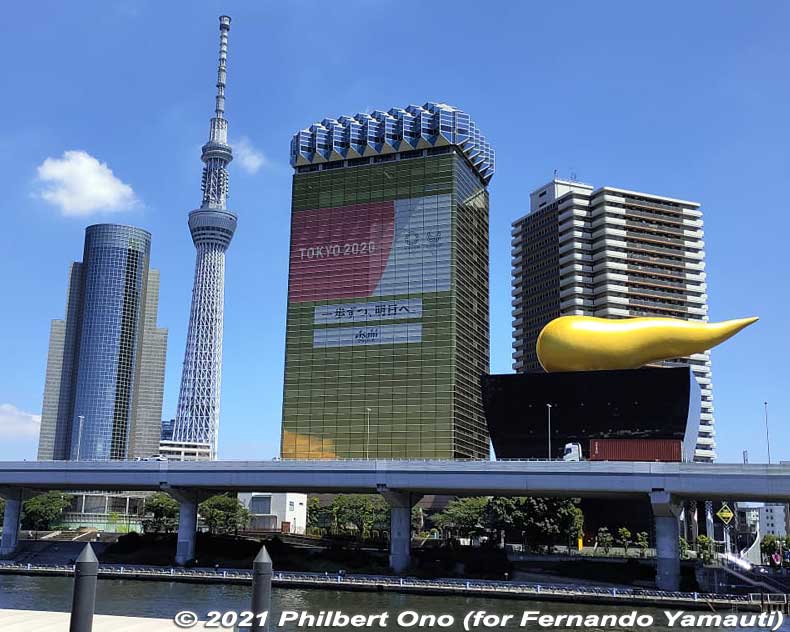
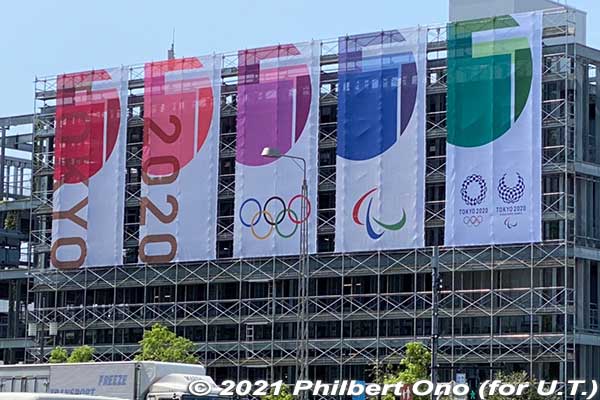
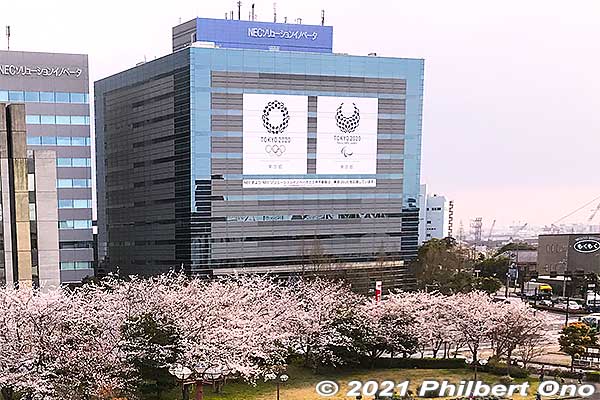


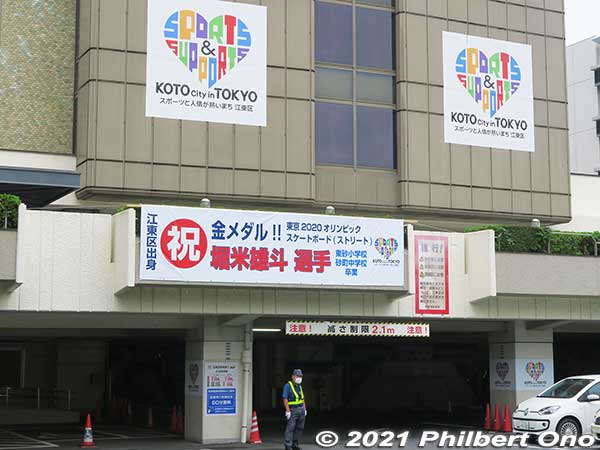
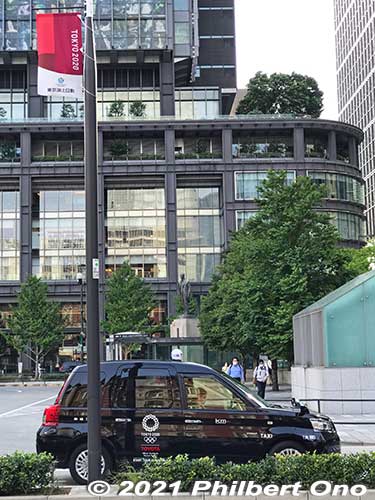
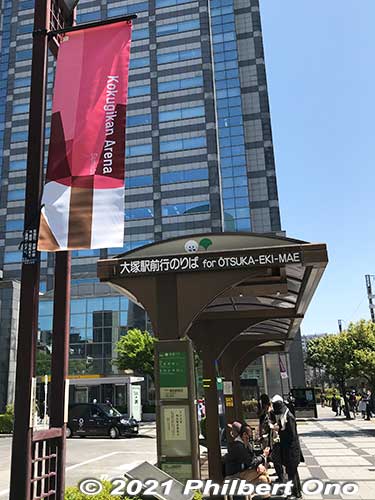
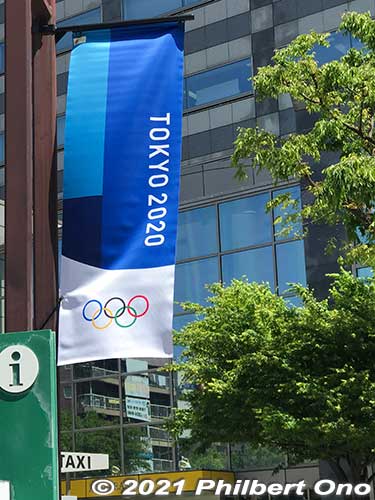
A: In Asakusa, from March 18, 2020, the Asahi Beer head office building had Tokyo 2020 emblems in Sakura pink to match the riverside cherry blossoms. The building supposed to resemble a glass of beer with yellow sides and foam on top. Photo by Fernando Yamauti.
B: PR banners in the traditional Japanese colors on a Toyosu Market building. Kurenai red, Sakura pink, Wisteria purple, Indigo blue, and Pine green. Photo by U.T.
C: Emblems on the Shin-Kiba Center Building in front of Shin-Kiba Station (near aquatics centre and water polo centre) in spring (cherry blossoms).
D: Team Japan‘s color (sunrise red) on the Fuji TV building steps in Odaiba.
E: ASICS Japan Headquarters in Koto City. ASICS was Team Japan’s official apparel maker. It also made the uniform for volunteers/staff and several Team Japan sports teams.
F: Koto City Hall displays a banner congratulating local son Horigome Yuto for winning the gold medal for street skateboarding.
G: Taxi in front of Tokyo Station.
H: Kokugikan banner at JR Kinshicho Station bus stop.
I: Blue banner at JR Kinshicho Station.
Train/Subway Station Look
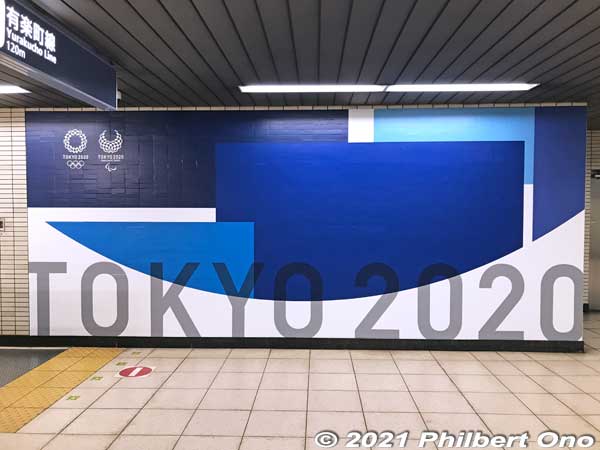
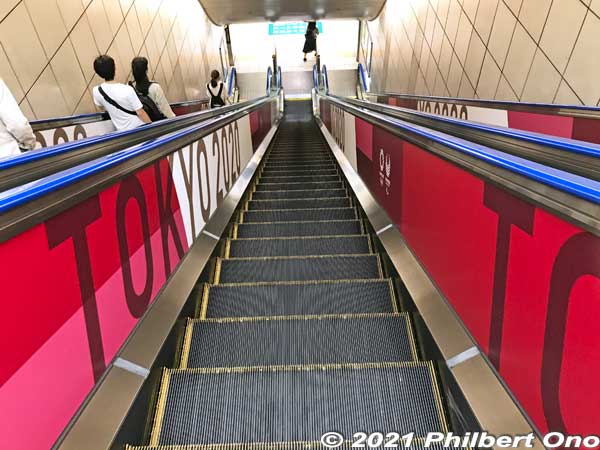
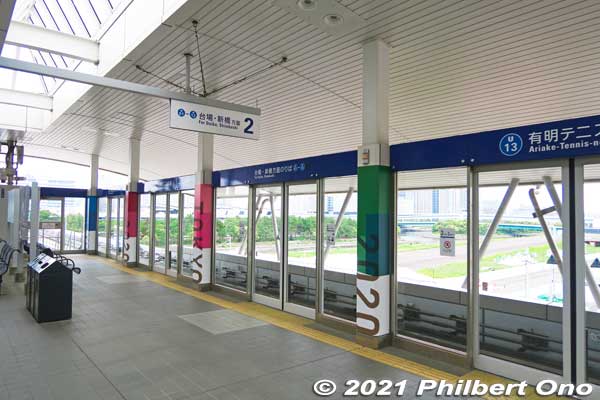
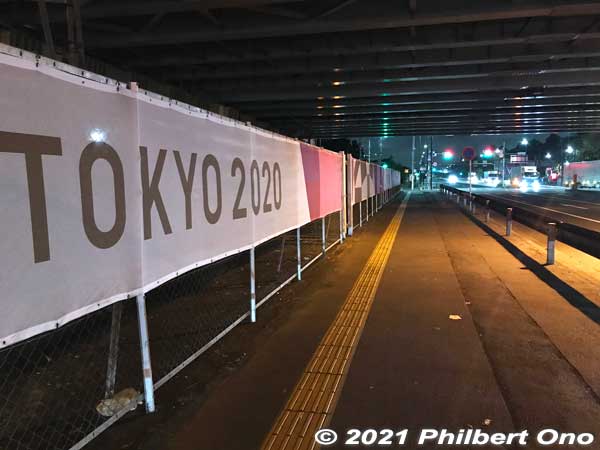
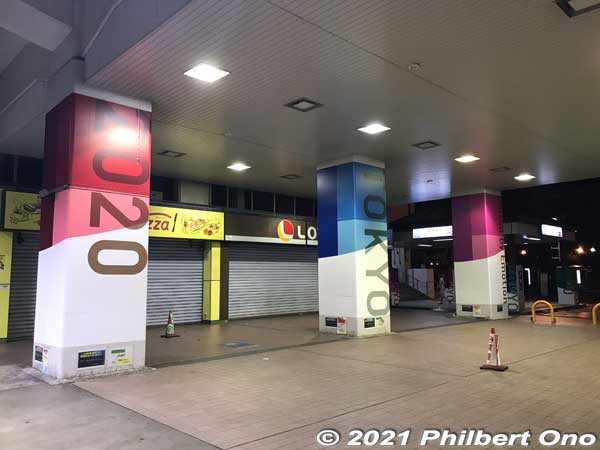

G: Tatsumi Station (near aquatics venues).
H: Escalator in red at Shin-Kiba Station (near aquatics venues).
I: Ariake Tennis-no-Mori Station platform.
J: Street banner near Shin-Kiba Station, looking toward Yumenoshima.
K: Pillars near Shin-Kiba Station entrance.
L: Shin-Kiba Station entrance.
Tokyo 2020 Official Shops
Tokyo 2020 Official Online Shop opened in June 2016 while 67 physical shops started opening from July 2018 nationwide. They sold merchandise from 128 licensed companies and stocked a record 7,871 licensed products. Official shops operated until autumn 2021.
All sales of licensed Tokyo 2020 merchandise by other vendors (ASICS, etc.) also stopped by the end of 2021 when the product licensing contract with the IOC expired.
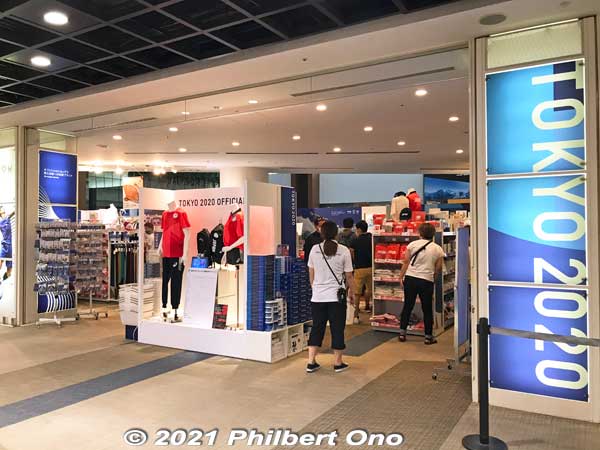
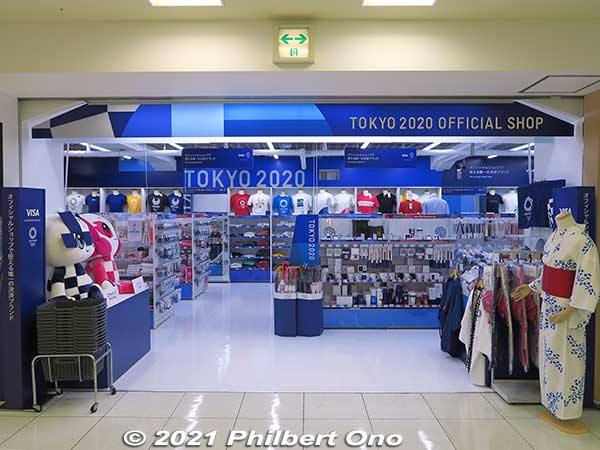
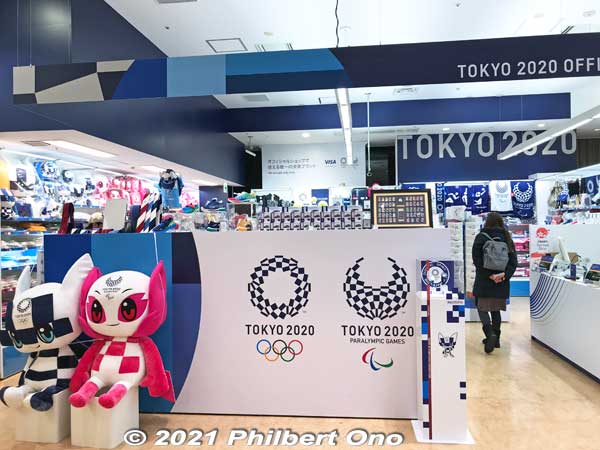


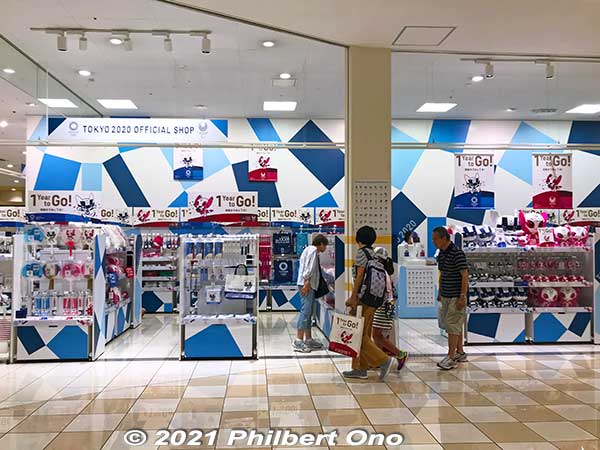

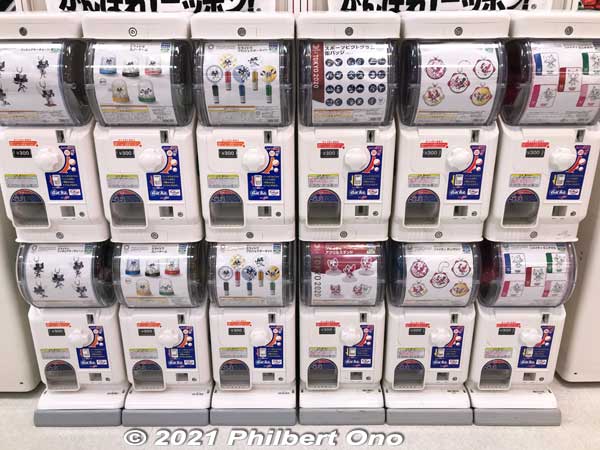
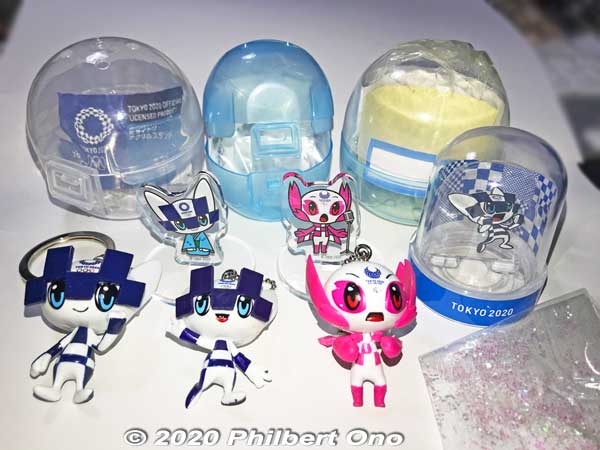

Or go to year:
2011 | 2012 | 2013 | 2014 | 2015 | 2016 | 2017 | 2018 | 2016 | 2017 | 2018 | 2019 | 2020 | 2021 | Olympics | Paralympics | Venues | 2022–2023

